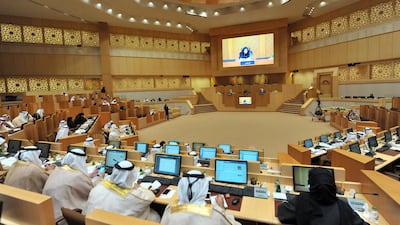The parliamentary season of the Federal National Council came to a close this week, meaning UAE citizens will soon head to the fifth round of elections before next year's session.
The FNC has played a pivotal role in shaping policies, fostering dialogue, and ensuring the representation of Emirati voices at the national level.
The council held its first session in 1972 and represents the citizens of the UAE, acting as a bridge between the government and the people.
Voting was introduced in 2006 and members hold office for four years.
Comprising 40 members – 20 elected representatives and 20 who are appointed – it provides a platform for discussions, debates, and decision-making on matters of national importance.
On Friday, Dr Anwar Gargash, diplomatic adviser to President Sheikh Mohamed, tweeted that the elected representatives were an increasingly effective component of UAE politics.
"With the conclusion of the Federal National Council of its 17th legislative term, the Emirates begins preparing for its fifth elections," Dr Gargash wrote.
"The experience that began in 2006 in response to the discourse of empowerment is growing and maturing institutionally to be an important part of the political scene, and within the thought of the leadership of the Emirates, the citizen remains the focus of this comprehensive and blessed development," Dr Gargash added.
The council can pass, amend and reject federal laws and discuss international treaties. It is also a forum for members to raise the concerns of ordinary Emiratis.
The 2019 elections proved hugely significant, as for the first time an equal number of male and female representatives were voted on to the council.
It was the late President Sheikh Khalifa who introduced rules requiring 50 per cent of FNC seats to be allocated to Emirati women.
The council sits from the third week of October and lasts no less than seven months.
Recently, officials announced changes to the voting system.
UAE citizens will be able to vote remotely – from inside and outside the country – at the next FNC elections.
Announced on Thursday, the National Elections Committee issued a resolution that would overhaul the way voting works for the fifth round of elections.
A new hybrid system will be used where remote votes will be combined with those counted at official polling stations, according to Wam.
The move is in line with the UAE's digital transformation and will enforce the rule that each voter has only one vote.
If anyone votes more than once, whether remotely or in the polling centre, only their last vote will be counted.

